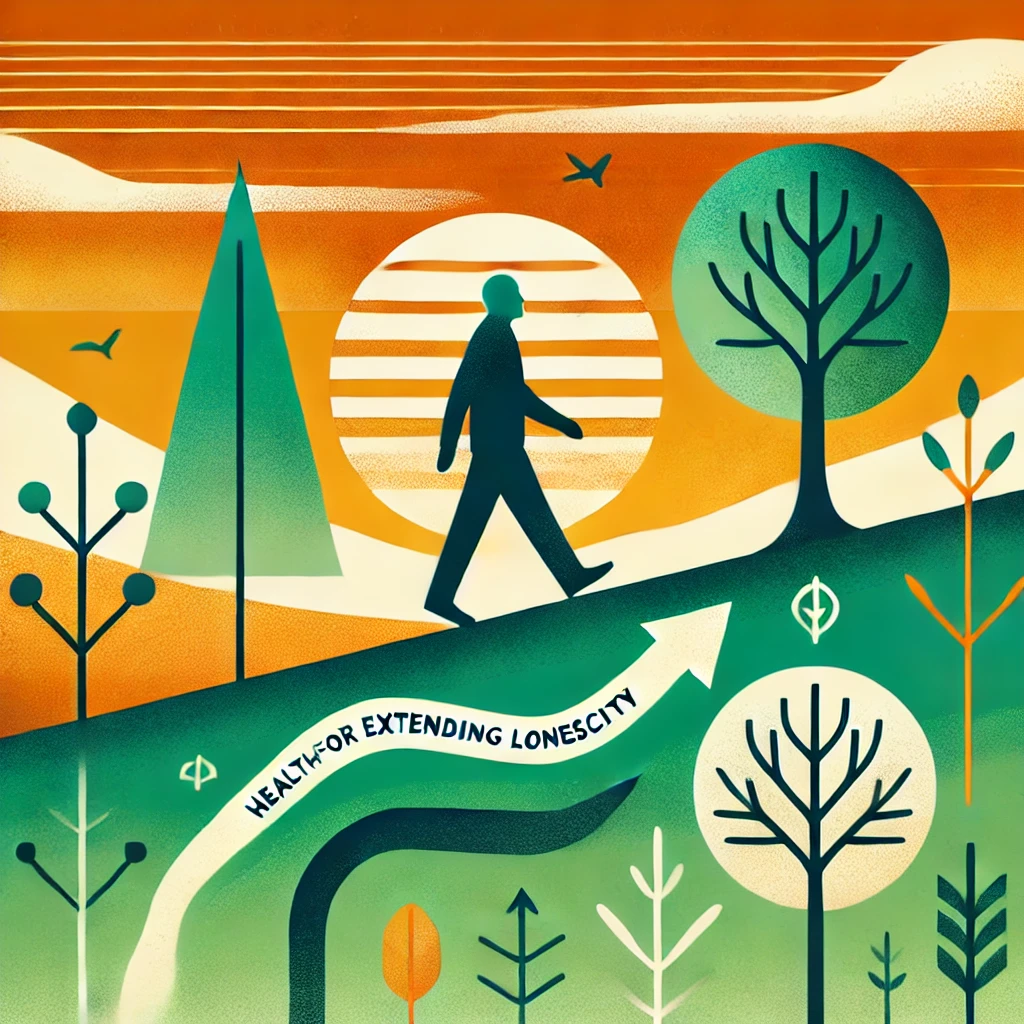Walking, one of the simplest forms of physical activity, is emerging as a powerful tool to boost overall health. Studies show that regular walking has multiple benefits—from enhancing lifespan to supporting digestion and promoting mental clarity. This article delves into how daily walking, post-meal strolls, and walking meditation can transform physical and mental well-being.
Walking to Extend Lifespan
For those looking to enhance their longevity, daily walking can be a powerful ally. Research suggests that regular walking can reduce the risk of chronic illnesses, such as heart disease, diabetes, and certain cancers. Achieving around 7,000 to 10,000 steps per day has been linked to a significant decrease in mortality rates, making it a key factor in extending lifespan.
The benefits of walking for cardiovascular health are particularly notable. Walking regularly improves blood circulation, helping to control blood pressure and supporting heart health. By strengthening the heart and improving vascular function, walking can reduce the likelihood of heart disease and stroke, which are leading causes of death worldwide. Additionally, walking helps manage weight by burning calories and boosting metabolism, making it a simple yet effective way to prevent obesity-related illnesses.
For beginners, aiming for 7,000 steps may seem daunting, but starting with smaller, achievable goals like 3,000 or 5,000 steps can make a difference. Increasing step count gradually and finding creative ways to incorporate walking into daily routines—like taking the stairs, parking farther from destinations, or scheduling short walking breaks—can add up to a healthier, longer life.
The Digestive Benefits of Walking After Meals
Walking after meals is a practice that has gained attention for its impact on digestion and blood sugar regulation. Studies show that a brief 10- to 15-minute walk after eating can help ease digestion, reduce bloating, and stabilize blood sugar levels, making it particularly beneficial for those managing diabetes or metabolic concerns.
Post-meal walking encourages peristalsis, the process of moving food through the digestive tract, which can help reduce discomfort and prevent sluggish digestion. It also helps regulate blood sugar by prompting muscles to use available glucose for energy, which can prevent sudden spikes in blood sugar levels. This regulation is especially helpful for people at risk of or managing diabetes, as steady blood sugar levels are critical for maintaining energy and avoiding complications associated with high blood sugar.
Making post-meal walking a regular part of the day doesn’t have to be time-consuming or challenging. Even a walk around the neighborhood, office, or nearby park can provide benefits. For people short on time, taking three short walks of 10 minutes each after meals throughout the day can have the same effect on digestion and blood sugar control as a single 30-minute walk, offering flexibility for busy schedules.
Walking Meditation for Mental Clarity and Stress Relief
Walking can also serve as a form of meditation, combining movement with mindfulness to promote mental clarity and stress relief. Walking meditation is a practice where individuals focus on each step, breath, and their surroundings, creating a moving form of meditation that allows them to center their thoughts and become more aware of the present moment.
In walking meditation, individuals walk at a slower pace, paying attention to the movement of each step and the sensation of their feet touching the ground. This awareness encourages a sense of calm, reducing stress and anxiety. Research shows that mindfulness practices like walking meditation can enhance focus, emotional resilience, and mental well-being. This practice offers a refreshing alternative to seated meditation, allowing participants to be active while also achieving the mental benefits of mindfulness.
Practicing walking meditation can be as simple as dedicating a few minutes to a quiet walk in nature or a serene space. For beginners, start with five to ten minutes of focused walking, gradually increasing the duration as mindfulness improves. Consistently practicing this technique can help build emotional resilience, providing a valuable tool for managing stress and finding clarity amid life’s challenges.
Making Walking a Daily Habit
Incorporating walking into daily life can be effortless and enjoyable. Walking requires no special equipment, can be done almost anywhere, and is accessible for people of varying fitness levels. Here are some practical tips for making walking a daily habit:
- Schedule Walking Time: Treat walking as a regular part of your day. Consider scheduling a morning or evening walk or using break times during work to get some steps in.
- Set Small Goals: Start with manageable goals, such as taking a 5-minute walk after each meal, and gradually build up your routine. This approach can help you increase your step count without feeling overwhelmed.
- Combine with Other Activities: Walking can be combined with other enjoyable activities, like listening to an audiobook, catching up on a podcast, or talking to a friend. This makes it easier to stay consistent and can make walking something to look forward to.
- Explore Walking Meditation: To enhance mental well-being, try practicing walking meditation in a quiet space. Focus on each step, your breathing, and the sounds around you. Walking meditation can help build mindfulness while also providing physical benefits.
Walking as a Holistic Approach to Health
Walking is one of the most accessible forms of exercise, offering benefits that go beyond just physical fitness. Regular walking can help you live longer, support digestive health, and provide a mindful escape from stress. This holistic approach to well-being is especially valuable because it can fit into a variety of routines and requires minimal effort to maintain.
For anyone looking to improve health, boost energy, and find moments of peace, walking is a simple and effective practice. Whether through daily walks, post-meal strolls, or walking meditation, taking time each day to walk can positively impact both physical and mental well-being, making it one of the best habits for a balanced, healthier life.
Sources:
Share this content:



